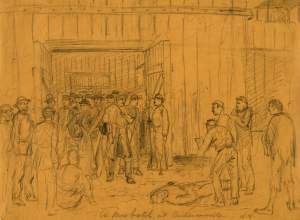Record Data
Source citation
Samuel P. Bates, The History of Pennsyvlania Volunteers, 1861-65 (Harrisburg, PA: B. Singerly, 1869), 1: 730.
Type
Diary
Date Certainty
Exact
Transcriber
Transcription adapted from The History of Pennsylvania Volunteers, 1861-65 (1869), by Samuel P. Bates
Adapted by Brenna McKelvey, Dickinson College
Transcription date
Transcription
The following transcript has been adapted from The History of Pennsylvania Volunteers, 1861-65 (1869).
Sunday, May 22.-Arrived at Andersonville, sixty miles from Macon. Here we were drawn into line and counted off into nineties, which constituted a detachment. After we were counted off a rebel officer said, " if there is any man among you who can write his name let him step two paces to the front;" the whole ninety, with one or two exceptions, stepped to the front; he then called for a Sergeant who could write his name; after getting one, placed us in his charge; our names were taken and we were marched into a prison containing about thirteen acres of ground, surrounded by a high stockade built of heavy pine logs and closely guarded by numerous sentinels who stood on elevated boxes overlooking the camp. About eight feet from the stockade was a low, rough built railing called the "dead line," to lay a hand on or pass which was death from a guard's musket. The camp contains about fifteen thousand men, most of-whom have been prisoners from eight to ten months, and were once strong, able bodied men, but are now nothing more than walking skeletons, covered with filth and vermin, and can hardly be recognized as white men. The horrible sights are almost enough to make us give up in dispair-the ground is covered with filth, and, vermin can be seen crawling in the sand. In the centre of the camp is a stream of dirty water so warm and greasy we can scarcely drink it. The sights I saw on this, my first day in Andersonville, so filled me with horror that I can give but a poor idea of this prison den.

